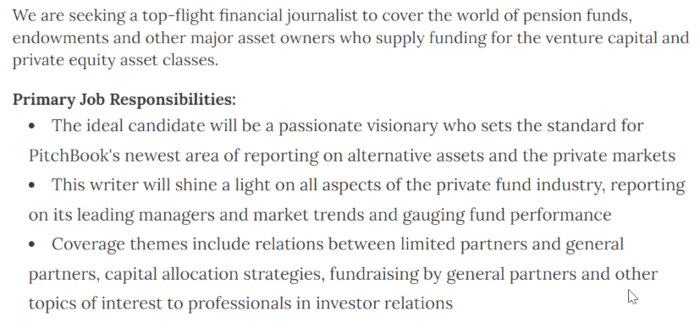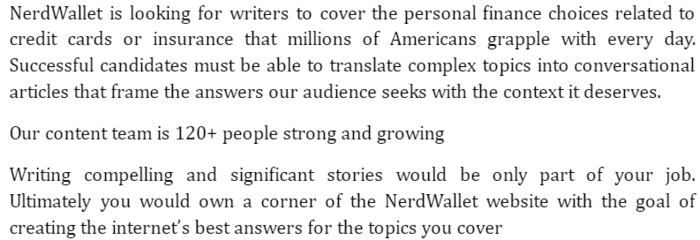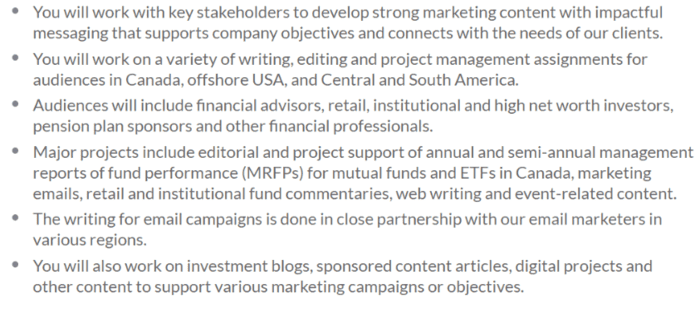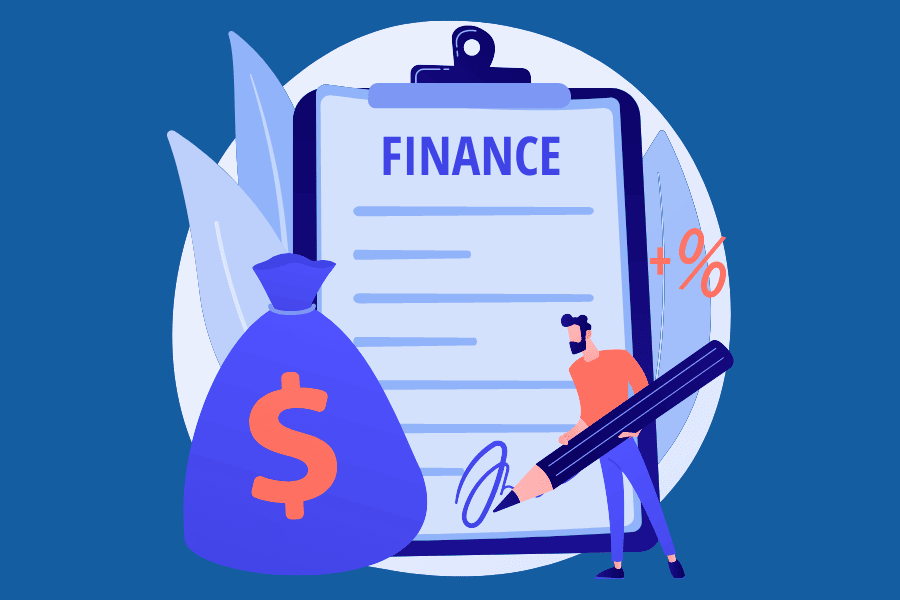If you work in the financial sector and are looking for a chance to flex your creative wings, finance writing jobs may be the key.
(Cuz let’s be honest, formatting Pivot tables doesn’t scratch the itch, amirite?)
Not only does writing in the finance niche offer the opportunity to be both analytical and inventive, but also, if you have experience in the industry, finance writing jobs can be lucrative.
Let’s talk money.
What Is Finance Writing?
| Finance writing is the creation of informative or actionable content relating to financial topics. |
Beyond this broad definition, finance writing is a choose-your-own-adventure profession.
For instance, you can specialize in any number of subjects. To name a few:
- Personal finance
- Investment banking
- Cryptocurrency
- Budgeting
- Passive Income
- Frugal Living
- FIRE (Financial Independence Retire Early)
- Real estate investing
- Taxes
And if that’s not enough variety for you, you also have an array of content mediums to choose from, including:
- Blogs
- Newspapers
- Magazines
- TV News
- Vlogs
- Social Media
- Books
You could even keep your topical focus general and write for publications covering the whole shebang of financial topics. The choice is yours!
Once you know what you want to write about and in what format, there’s only one thing to do.
Find a job.
How to Find Finance Writing Jobs
For a running start, the following sections describe the best strategies for finding finance writing jobs, including:
- Job Boards
- Publications
- Blogs
- Full-Time & Part-Time Jobs
Find Freelance Jobs On Job Boards
If you’re planning to moonlight in finance writing for extra cash or want the flexibility of working for yourself, freelance writing is a great option. Job boards are an excellent resource for finding a freelance writing gig.

Examples of Job Boards
- Problogger (blogging)
- Upwork (anything from blogging to emails to website copy)
- Writezillas (writing agency with curated job boards)
- Prowriter (writing agency with curated job boards)
- Contentwritingjobs (anything from blogging to journalism)
Tip: You may also find freelance job listings on your standard job search sites (think LinkedIn, Indeed, Glassdoor), but these lean more towards full-time and part-time employment versus freelance work. Though it never hurts to look!
Pros & Cons of Job Boards
| Pros | Cons |
|---|---|
| Most job boards are free for job seekers Availability of a tremendous volume of job opportunities Many job boards allow you to store your resume for viewing by employers, whether you apply for their job postings or not Centralization of jobs can save the job seeker a ton of time | The sheer amount of listed job opportunities may prove overwhelming Anyone with internet access can use job boards, increasing competition tenfold Some posts may be junk, and weeding these out can become cumbersome Writing agencies may offer only offer low compensation jobs (3 cents per word) |
Submit Proposals to Authoritative Publications
Suppose you have an extensive background in a specific financial subject, whether professionally or via certifications (gotta love having letters after your name).
In that case, you may take the more traditional approach of writing for publications.

Examples of Authoritative Publications
- Seeking Alpha (investing)
- Financial Times (opinion, any financial topic)
- Stocks & Commodities Magazine (trading)
- Fortune (business)
- The Economist (politics, economics, business)
Tip: Get your toes wet with HARO, or “Help A Reporter Out.” With HARO, a journalist will include your expertise in their articles, making it a great way to get your name out there (with minimal work!). Plus, you can cite the publication on your resume and website!
Pros & Cons of Job Boards
| Pros | Cons |
|---|---|
| Getting a byline in a well-known publication gives you authority in your field Magazines and newspapers pay well, from $30-$50 per article to upwards of $1,000 The pitching process helps you build a vast network for future jobs or references | Getting your foot in the door can be challenging, as some publications are invite-only or don’t publish information on how to submit article pitches Landing jobs may require cold calling current editors or writers, which takes time and legwork The publishing entity may have slow or inconsistent payment timelines |
Look For Blogs That Hire Freelance Writers
If you’re explicitly interested in blogging but aren’t sure you want to start a blog, you can become a contributor to existing finance blogs.

Examples of Financial Blogs
- Motley Fool (investing)
- Clevergirl Finance (personal finance for women)
- Bitcoin Tech Weekly (all things bitcoin)
- Dollar Stretcher (frugal living)
- FreshBooks (accounting)
Tip: Don’t underestimate the importance of your author byline. A byline is your elevator pitch on who you are and what you do. Take this opportunity to provide contact information and links to extra content or freebies.
Pros & Cons of Writing for Finance Blogs
| Pros | Cons |
|---|---|
| Getting a byline in a popular blog strengthens your authority Great opportunity for linking to your website, contributing to improved search engine visibility | If controversy arises around the blog, your name could be negatively associated with the website Blogs may ask you to be a ghostwriter, in which case you won’t receive an author byline |
Take a Full-Time or Part-Time Job
If you’re looking for a consistent paycheck, your best bet is a full-time or part-time finance writing job. You can find these on a company’s “Careers” page on their website or via platforms like LinkedIn, Indeed, Glassdoor, and Ziprecruiter.

Examples of Finance Writer Job Postings
- Sr. Financial Writer, Private Equity @ Pitchbook

- Writer (Personal Finance) @ Nerdwallet

- Investment Writer @ Franklin Templeton

Pros & Cons of Traditional Jobs
| Pros | Cons |
|---|---|
| Assurance of consistent income and benefits Easy access to mentors and training | An employer may ask you to work in a specific location You may not have a say in the content you write |
BONUS: Why Work For Someone Else When You Can Work For Yourself?
Okay, but what if you’re tired of working for someone else? You want full autonomy about what, when, and where you write.
In this case, I’d suggest launching your own blog.
Starting a blog gives you total control over the 5 Ws of your content generation and opens up a world of opportunities to generate income through writing.
A few examples of how you can earn money with a blog include:
- Affiliate Marketing
- Advertising
- Sponsored Posts
- “Member’s Only” Content
- Online Courses
If starting a blog has your name written all over it, check out these posts for a deep dive into how to get started.
- 25+ Popular Types of Blogs in 2023 (+ Examples for Inspiration)
- How to Make Money Blogging: Your FREE Guide for 2023
How To Become A Financial Writer
Whatever the topic, subject matter expertise is beneficial but not necessarily mandatory to build a successful writing career.
But in finance, the barrier to entry is especially high. And rightly so.
Why? Because in finance writing, you’re effectively offering the reader financial advice. So the readers want to know that your word is dependable.
To that end, factors that help to prove your credibility may include a mix of the following:
- Education: Undergraduate degree in journalism or finance
- Professional Certifications: Certified Financial Planner, Certified Financial Analyst, Certified Management Accountant, etc.
- Job Experience: Current or previous careers in the relevant financial topic
However, although the above may give you a leg up in acquiring a finance writing job, you can likely get on without them by starting with smaller blogs, publications, and companies and working your way up.
How Much Do Finance Writers Make?

Now for the good stuff.
How much cash can you make writing about cash?
On average, finance writers earn $58,000 to $97,000 annually.
Check out the following resources for more specific information based on your unique fact pattern (location, job type, etc.).
Finance Writing Jobs Are A Hot Ticket. Snatch One Up Today
Inspired to break out of the monotony of spreadsheets? To dust off your creative alter ego?
Then go ahead.
Pick your topic. Will you write about investments? Personal finance? Retirement?
Now pick how you want to write. Do you want to start a blog? Write for WSJ? Develop an email campaign for a financial start-up?
Choose your adventure and click “apply” today.




